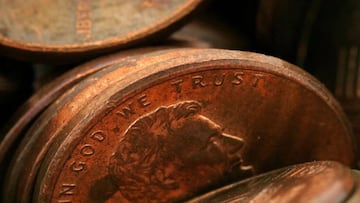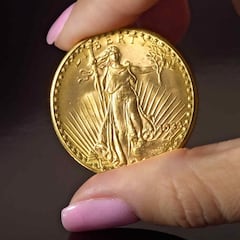These are the most valuable one-cent coins: find out if you have one
Throwing away spare change is not a good idea, especially when there are coins that can be worth thousands of dollars. Here are the most valuable pennies.

Every day, thousands upon thousands of coins continue to exchange hands throughout the country despite the widespread use of credit cards. The vast majority of these are only worth their face value, but some of them can sell for thousands of dollars to collectors.
This is the case of certain one-cent coins, which, thanks to certain characteristics they bear, have come to be worth thousands and even hundreds of thousands of dollars. Find out more about the most valuable pennies and how to identify them.
READ ALSO: Making a mint of these US coins
The most valuable one-cent coins
The website Coin Trackers made a report of the most valuable pennies ever minted in the United States. The database of this specialized site is made up almost entirely of coins from 1880 to 2023- coins that are more easily accessible and possibly still in circulation.
Here the five most valuable one-cent coins and their estimated prices:
Steel Wheat from 1944
In average condition this coin is worth $10,000, while one in perfect condition could be worth around $408,000.
Copper Wheat from 1943
In average condition it is worth $60,047, while one in perfect condition could be worth around $250,000.
Flying Eagle from 1856
In average condition it is worth $8,000, while one in perfect condition could be worth around $25,000.
S Wheat from 1924
One in perfect condition could be worth around $12,000. However, in average condition it is worth around $4.
Indian Head from 1873
In average condition it is worth $20, whileone in perfect condition could be worth around $10,000.
READ ALSO: Quarters worth thousands
How is the value of a coin calculated?
According to the American Numismatic Association, the variables that determine the value of a coin are the mintage number, the grade or state of preservation of a coin, and demand.
Minting number
A coin that has a lower mintage number generally means it is rarer, so it would have a higher value.
Condition
The better the state of preservation, the more valuable the coin. A coin with imperfections that are not minted is not the same as one that is well-cared for or classified as a collector’s item and encapsulated for conservation.
Demand
Related stories
There are coins that are always in high demand, while there are others that are rarely in demand, which makes them differ in value. There are also currencies that are cyclical, meaning they increase in value, reach a certain level and then go down.


Complete your personal details to comment